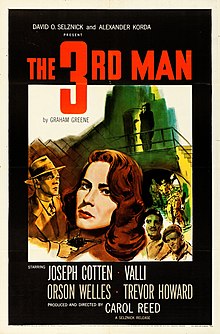
Back الرجل الثالث (فيلم) Arabic الرجل التالت ARZ El tercer home AST اوچونجو آدام (فیلم) AZB Трэці чалавек Byelorussian Третият човек Bulgarian দ্য থার্ড ম্যান Bengali/Bangla Treći čovjek BS El tercer home Catalan Třetí muž Czech
| The Third Man | |
|---|---|
 American theatrical release poster | |
| Directed by | Carol Reed |
| Screenplay by | Graham Greene |
| Produced by |
|
| Starring | |
| Cinematography | Robert Krasker |
| Edited by | Oswald Hafenrichter |
| Music by | Anton Karas |
Production company | |
| Distributed by |
|
Release dates | |
Running time | 104 minutes |
| Countries | |
| Languages |
|
| Box office | £277,549 (UK) (equivalent to £12,386,000 in 2023)[5] |
The Third Man is a 1949 British film noir directed by Carol Reed, written by Graham Greene, and starring Joseph Cotten, Alida Valli, Orson Welles and Trevor Howard. Set in post-World War II Allied-occupied Vienna, the film centres on American writer Holly Martins (Cotten), who arrives in the city to accept a job with his friend Harry Lime (Welles), only to learn that he has died. Martins stays in Vienna to investigate Lime's death, becoming infatuated with Lime's girlfriend Anna Schmidt (Valli).
The use of black-and-white German expressionist-influenced cinematography by Robert Krasker, with its harsh lighting and Dutch angles, is a major feature of The Third Man. Combined with the use of ruined locations in Vienna, the style evokes exhaustion and cynicism at the start of the Cold War.
Greene wrote a novella as a treatment for the screenplay. Composer Anton Karas' title composition "The Third Man Theme" topped the international music charts in 1950, bringing international fame to the previously unknown performer. The Third Man is considered one of the greatest films of all time, celebrated for its acting, musical score, and atmospheric cinematography.[6]
In 1999, the British Film Institute voted The Third Man the greatest British film of all time. In 2011, a poll for Time Out ranked it the second-best British film ever.[7]
- ^ "Alexander Korda Credits". -B.F.I. Accessed 10 January 2016
- ^ a b c d "The Third Man (1949)". AFI Catalog of Feature Films. Retrieved 7 October 2023.
- ^ "The Third Man". Art & Hue. 2018. Retrieved 2 February 2018.
- ^ a b "The Third Man (1949)". British Film Institute. Archived from the original on 2 March 2016. Retrieved 22 March 2020.
- ^ Vincent Porter, 'The Robert Clark Account', Historical Journal of Film, Radio and Television, Vol 20 No 4, 2000 p489
- ^ Halliwell, Leslie and John Walker, ed. (1994). Halliwell's Film Guide. New York: Harper Perennial. ISBN 0-06-273241-2. p 1192.
- ^ "100 best British films: the full list". Time Out. London. 9 February 2011. Archived from the original on 13 February 2011.